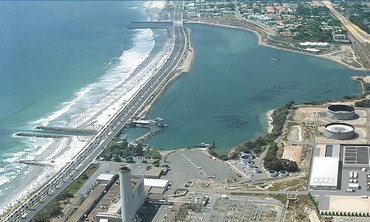 |
| Carlsbad power station site in San Diego area Photo: Courtesy IDE |
IDE Americas Inc., a subsidiary of Israel’s IDE Technologies Ltd, to design project - the largest of its kind in western hemisphere.
The Israeli desalination giant that is already responsible for the brunt of Israel’s salty-to-fresh water transformation is now taking on San Diego, in the biggest desalination project to hit the western hemisphere.
IDE Americas Inc., a subsidiary of Israel’s IDE Technologies Ltd, will be designing a 204,412-cubic-meter seawater desalination plant for the San Diego region, the company announced on Sunday. The $922 million plan, called Carlsbad Desalination Project, is being administered by Poseidon Resources (Channelside) LP, a subsidiary of Poseidon Water LLC, and will be carried out in partnership with the San Diego County Water Authority.
For the design contract, IDE will be receiving $150m., while the O&M agreement will bring the company $500m. Construction of the plant will begin this year and is slated to begin bringing high-quality drinking water to the San Diego area by 2016, a statement from IDE Technologies said. The hope is that the new desalination plant will help San Diego County Water Authority alleviate its water shortage and achieve its goal of supplying 7 percent of the region’s water through desalination by 2020 – “creating a new map of the American water market,” the statement added.Kiewit Shea Desalination, a joint venture between subsidiaries of companies Kiewit Corp. and J.F. Shea Construction Inc., will be providing the engineering, procurement and construction (EPC) of the facility as well as the 10-mile (16- km.) pipeline required to deliver the treated water per day produced there, according to Poseidon Resources. Meanwhile, IDE Americas Inc. will design the processing plant, and will also be responsible for operation and maintenance (O&M) of the plant under a 30- year contract.
“The Carlsbad Desalination Project is a significant milestone for us, California and the US at large, as we believe it will set the stage for the future of desalination in America,” said Avshalom Felber, CEO of IDE Technologies Ltd. “For decades, we’ve successfully completed similar projects in countries all over the world, and we’re excited to be a part of what will be the largest desalination plant in the US.”
Based in the Sharon Industrial Park in Kadima, near Netanya, IDE has built and operates some of the world’s largest desalination plants, currently providing a cumulative capacity of over 2.3 million cubic meters a day around the world, according to the firm.
The company has worked in 400 plants in 40 countries over four decades thus far – including Israel’s own Ashkelon and Hadera desalination plants, as well as the future Sorek facility.
“The Carlsbad project that we’re about to embark upon will accelerate both the visibility of desalination in North America and the ability of potential clients, both public and private, to understand how creative project delivery, creative finance and innovative process design allow these types of projects to happen,” said Mark Lambert, CEO of IDE Americas. “The movement in the US toward desalination has been a long time coming, and we’re ready to lead the charge.”
While there are many industrial desalination projects already throughout North and South America, there are very few such plants for the mainstream populations of these two continents, Felber told The Jerusalem Post on Sunday. “This is a developing market as far as desalination is concerned,” he said. Because this is the first major mainstream desalination project in the region, IDE can by default end up in the “unique position as the leading desalination company in the whole area,” Felber explained.
Although IDE has a huge amount of experience in building and operating desalination facilities, until now it has been difficult to enter the American market, and this project gives the company the opportunity to show that it is able to operate according to American standards, Felber said. When vying for the project, IDE was competing with companies from France and Spain as well as one local American firm. The San Diego Water Authorityhas already signed on 20 municipalities within its bounds that have committed to receiving the desalinated water when it comes online, Felber noted.
After completing this project, he stressed that IDE would like to expand its involvement in the emergent American desalination market, looking specifically to regions like Florida, Texas and other parts of California.
“It’s no news that we and other Israeli [desalination] companies are well-known,” Felber said. “The real global news is entering the American market, which is really hard to penetrate.”












.jpg)
































